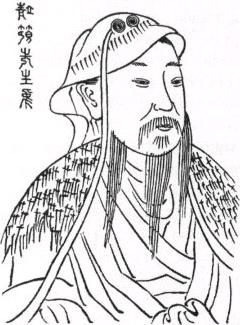|
陶淵明沒有正式皈依佛教,但從他的詩裡邊,我們可以看到他是明顯地受到過佛教的影響。今天上午,我在(加拿大溫哥華)卑詩大學上課的時候,有一個學生告訴我說,前幾天學校裡邊演一部電影,介紹中國民間的思想、信仰、風俗、習慣。他說那個電影裡邊介紹說,中國人常常把儒家的、道家的、佛家的思想都結合起來。陶淵明的思想裡邊,就有這三種思想精華的結合。
比如我上次就曾經引了陶淵明《飲酒》詩的第十六首詩中的兩句:「少年罕人事,遊好在六經」。他說,當我年少的時候,「罕」就是稀少的意思。那時沒有繁雜的、亂七八糟的事情來打擾我,我可以專心地唸書。他唸什麼書呢?他說:「遊好在六經」。「好」就是喜好、愛好。他愛好什麼?《六經》;《六經》就是儒家的經典。一般是《詩》、《書》、《禮》、《樂》、《易》、《春秋》。《樂》現在是沒有了。有人說《樂》應該是跟《詩》、《禮》結合的。總而言之,《六經》是儒家的經典。他說他少年的時候沒有被一些人間繁雜的事情分心,他很喜歡讀儒家的經典。什麼叫做「遊」呢?你們以為遊戲的時候才是「遊」嗎?你們覺得唸書是很苦的,可是你要知道,人家愛唸書的人,是在唸書的同時享受到一份遊戲般的樂趣。由此可以看出陶淵明確實是受了儒家思想的影響。
此外,他也有道家的思想。他的詩裡邊,曾經有這詩句說:「久在樊籠裡,愛得返自然。」(《歸園田居》之一)。這是說他在做官的時候,受到許多約束,就像一隻鳥,長久地被關在樊籠裡邊。所以他後來棄官不做了,又歸田種地了。他說當我又回到自然的生活中去時,就像籠中的鳥,又重新獲得了飛翔的自由一樣。
上一次,宣公上人曾經背過陶淵明一篇很有名的文章,叫做《歸去來兮辭》。文中也表現了,陶淵明愛好自然的這種天然本性和思想情趣。
而這些都是道家的思想。道家以為,人世之間不應有限制,不應有約束,應該返璞歸真,順應自然。可見陶淵明的思想中也包含著深厚的道家思想。
此外,他還有佛家思想的影響。他的《歸園田居》裡有過這樣的句子說:「人生似幻化,終當歸空無。」他說人生就好像是一個幻影一樣,佛經上說的:「如夢如幻」,就是說世間萬象如同夢幻一樣,都是虛無的、空幻的,轉眼就消失不見了:「人生似幻化」;「終當歸空無」,是說最終結果都是空無,所謂『四大皆空。』以上可以看出他有儒家的思想、有道家的思想、也有佛家的思想。

但無論哪種影響,到了陶淵明的思想裡,都會立刻與他自己的思想結合起來。他內心之中,有一種自我的定力與持守;守是操守。許多人沒有一個恆定的自我把持的能力,自己把守不住自己。所以常常隨波逐流,被引誘、被轉移。
在中國詩人裡邊,內心之中最有持守的、並最能夠掌握自己的,就是陶淵明。而他內心持守的力量,是來自於對儒家、道家、佛家各種思想中,最寶貴之精華的接受和吸收。他不但是掌握了那些外表的言辭、道理、形式,而且他真正地在內心之中,能夠掌握、接受各種思想裡面,最好的、最有價值的東西。
所以陶淵明才能夠在那種黑暗、混亂、充滿戰亂、痛苦的時代裡,沒有被迷亂、沒有失落自己。這一點是陶淵明很了不起的地方。我們以後會以他的詩裡邊,慢慢地、一點一點地得到證明的。好,今天我們先講到這裡。
待續
|
|
Although Tao Yuanming did not formally take refuge with Buddhism, in his poems, we can tell that he was obviously influenced by Buddhism. When I was teaching at UBC (University of British Columbia) this morning, a student told me that UBC had played a film introducing Chinese people's thoughts, beliefs, customs, and habits few days ago. He said that in the movies, the Chinese usually combine the ideas of Confucianism, Taoism and Buddhism. Tao Yuanming also combined the best parts of these three teachings in his own ideas.
For example, I referred two lines of the sixteenth poem in Tao Yuanming's
Drinking Poems: "Hardly involved with worldly affairs as a youth, I enjoyed studying the
Six Classics." He said, "When I was young, there were no defiled, troublesome things bothering me, so I could concentrate on my studies." What did he study? He said: "I enjoyed studying the Six Classics." ‘Enjoy’ means ‘like’ and ‘favor’. What did he like and favor? The
Six Classics.
The Six Classics are the classic books of Confucianism. They are the
Book of Poetry, the Book of History, the
Book of Rites, the Book of Music, the Book of Change, and the
Spring and Autumn Annals. The Book of Music is no longer in existence now. Someone said that the
Book of Music should be combined with the Book of Poetry and the
Book of Rites. In general, the Six Classics are the classic books of Confucianism.
He said that when he was young, he was not distracted by troublesome worldly things. He enjoyed reading the Confucian classics. What does it mean to ‘enjoy’? Do you think that you enjoy only when you play? You think studying is hard, but you should know that to those who like to study, it is as fun as playing games. From this, we can tell that Tao Yuanming was indeed influenced by Confucianism.
He was also influenced by Taoist thought. A line in his poem says: ‘Having stayed in a cage for a long time, I long to return to Nature.’ (from: "Returning to Country and Farming") That is to say, when he was an official, he was under a lot of restrictions, so he felt like a bird that had been caged up for a long time. Therefore he resigned his post and returned home to take up fanning again. He said, "When I return to a life close to Nature, I’m like a caged bird regaining the freedom to fly where it pleases."
Last time, Venerable Master Hsuan Hua recited a famous es say of Tao Yuanming’s, "Return." In that essay, Tao Yuanming expresses his innate love of Nature, which is basically a Taoist attitude. Taoists believe that there should not be any artificial limits or restrictions among people; we should return to a simple life and let things take their natural course. From this, we can see that Tao Yuanming's thinking contained the profound ideas of Taoism.
In addition, he was also influenced by Buddhism. A line in his "Returning to Country and Farming" says: "Life is like an illusion; everything returns to emptiness." He said that life was just like an illusory shadow. As a Buddhist Sutra says, "like dreams, like illusions," which means all worldly phenomena are like dreams, empty and illusory, vanishing in an instant. Thus, "life is like an illusion." "Everything returns to emptiness" means that in the end, everything is empty. As we say, "The four elements are all empty." From this, we can see that he adopted the ideas of Confucianism, Taoism, and Buddhism.
However, no matter what kind of influence Tao Yuanming encountered, he could immediately integrate it into his own thinking. In his mind, there was a power of calm concentration and perseverance—that is, integrity. Many people lack the ability to remain steadfast; they can’t stand their own ground, so they follow the crowd and are tempted and influenced by their surroundings.
Among the Chinese poets, Tao Yuanming had the greatest perseverance and integrity. His power to persevere was based upon his acceptance and absorption of the essentials of various philosophies, such as Confucianism, Taoism, and Buddhism. He mastered not only the external words, doctrines, and rituals, but also had a thorough internal understanding and acceptance of the best and most valuable parts of those schools of thought.
Therefore, Tao Yuanming was not confused. He didn’t get
lost in that dark and chaotic time filled with wars and sufferings.
This is what made Tao Yuanming outstanding. Later, we will
gradually verify this point bit by bit in his poems. But for today,
we will stop here.
To be continued
|